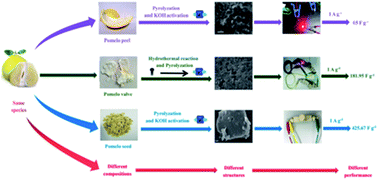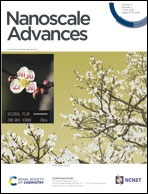Effect of pomelo seed-derived carbon on the performance of supercapacitors†
Abstract
Electrochemical ultracapacitors derived from green and sustainable materials could demonstrate superior energy output and an ultra-long cycle life, which could contribute to next-generation applications. Herein, we utilize pomelo seeds, a bio-waste from pomelo, in high-energy and high-power supercapacitors by a facile low-cost pyrolysis and activation method. The as-synthesized hierarchically porous carbon is surface-engineered with a large quantity of nitrogen and sulfur heteroatoms to give a high specific capacitance of ∼845 F g−1 at 1 A g−1. An ultra-high stability of ∼93.8% even after 10 000 cycles (10 A g−1) is achieved at room temperature. Moreover, a maximum energy density of ∼85 W h kg−1 at a power density of 1.2 kW kg−1 could be achieved in 1.2 V aqueous symmetrical supercapacitors. The results provide new insights that will be of use in the development of high-performance, green supercapacitors for advanced energy storage systems.



 Please wait while we load your content...
Please wait while we load your content...